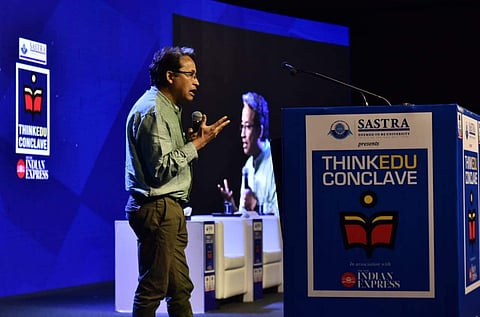

If in an education system people are failing, maybe there is something right about them that the system could not comprehend — this thought inspired educationist Sonam Wangchuk to explore alternative methods to educate those who are left behind by the mainstream education system. Speaking at The New Indian Express' ThinkEdu Conclave 2020 in Chennai on January 8, Sonam described his inspiring journey from an engineering student to a pioneer in revolutionising education.
Sonam was pursuing engineering as a mechanical engineer and was also teaching students to support his education. "I noticed that the otherwise bright students failed their Board exams. They were very bright, the system was just against them. I realised that the lessons they are trying to memorise so hard have no connection whatsoever with the lives these kids were leading," he recounted. "Children from the distant-most parts of Ladakh, where the temperature in winters goes down to -30°C, would be sitting in nomadic classrooms and mugging up an alien language like English and concepts like 'F for Fan' — this does not make sense at all. The idea of this pedagogy was that the children would have an object to relate to the letter F that is abstract to them. But here, neither the teacher nor the student has seen a fan in their entire life," he opined.
The curriculum was copied from Srinagar and pasted 13,000 ft above, he said. "But I soon realised that the system did not respect the diversity of this country. Srinagar too was facing the same problem — their curriculum was copied and pasted from New Delhi. Much later, I realised that the Delhi curriculum was copied from London," he added. "I went back and, with other like-minded people, started a movement to change this system and since most of the systems were from rural, distant areas, the idea was to change the system there," Sonam said.
Sonam and his team did what they could in their limited capacity — by changing the textbooks, adopting a curriculum that made more sense to the students there, training the teachers to engage the students in a more interactive format. "We also organised people to take ownership of their schools so that they became stewards of the system. With these interventions, the school results started changing — from 5 per cent it went up to 55 per cent in seven years and then gradually, to 75 per cent," he said, to a packed house.
But this was not enough. So they decided to concentrate on the 25 per cent that was still failing exams. "Even one per cent is serious if it affects your children — otherwise, you just take it as statistics. Together with a batch of 20-odd 'failure' students, we went to the banks of the River Indus in the middle of nowhere and thought of establishing a school that will flow with the rhythm of nature. Our belief was that if in a very bad system some people fail, there must be something right about them," he added. "We need a lot of brainstorming to come up with an education system that does not blindly ape the West but caters to the Indians it aims to teach," concluded Sonam.
